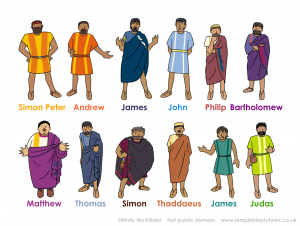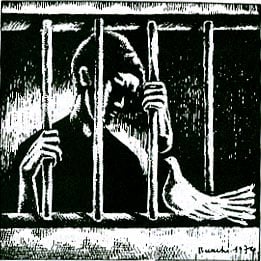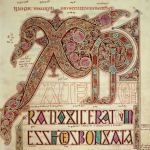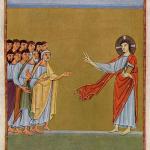
Mark has Jesus predict both his passion and his resurrection three times. The disciples don’t understand the first because they don’t want to. They don’t understand the second because they can’t.
Fifteenth in a series on “The Worldly Spirituality of Mark’s Gospel” with help from Ched Myers’ Binding the Strongman: A Political Reading of Mark’s Story of Jesus. The Introduction and a Table of Contents are HERE.
I want to work my way into, if not through, a puzzle regarding Jesus’ predictions of the resurrection in Mark. Every time Jesus mentions that he will suffer and die, he also mentions rising from the dead. Every time he does that the disciples either pay no attention to the rising part or they don’t understand it, “questioning what rising from the dead meant.” (Mark 9:10)
Now, rising from the dead seems like a perfectly straightforward idea. Harry Houdini, the great escape artist, was born a short drive from my hometown. In his old age told his wife that, if it was at all possible, he would come back from the dead. If he didn’t do it, she could be assured that it wasn’t possible. It would prove that all the seers and séance specialists, who claimed to be able to contact the dead, were a bunch of quacks. Harry had been spending a good part of his time investigating and exposing these fakers. Whether or not Harry’s wife believed him, it’s clear that she at least understood him.
Resurrection not entirely new to the disciples
But the disciples don’t understand Jesus when he says, “… and rise after three days.” (Mark 8:31) The trouble is, Jesus isn’t proposing an entirely new idea. The disciples already have some beliefs about resurrection. They think like first-century Jews. Resurrection was a common, though not universal, Jewish belief. Martha, Lazarus’s sister says in the Gospel of John, “I know my brother will rise again on the last day.” (John 11:24)
The disciples believed this too, and it made Jesus’ sayings really puzzling. After the Transfiguration scene, Jesus warns them not to tell what they had seen “except when the Son of Man had risen from the dead.” Was Jesus telling them they would live to see the resurrection on the last day? Was the “last day” going to arrive so soon? Or, perhaps, Jesus was buying into one of the newly arrived Greek ideas about immortal souls?
Why doesn’t Jesus explain more clearly—if this is indeed a saying of Jesus? I feel OK raising the possibility that Jesus didn’t say it only because eminent Catholic scholars do. Walter Kasper writes:
If Jesus had foretold his death and Resurrection as clearly as that [contained in Mark’s three predictions, for example], the flight of the disciples, their disappointment and their initial refusal to accept the evidence of the Resurrection would have been completely incomprehensible. (Jesus the Christ, p. 115)
A more human type of foreknowledge
Attributing very specific knowledge of the future to Jesus also raises a theological problem for me. Jesus, whom we believe to have lived a human life, essentially like us in every way except sin, must have experienced a death essentially like ours as well. Otherwise, if I may be a bit irreverent, his passion would have gone something like this:
Jesus is on the cross thinking, “By the sun it’s about two o’clock. One more hour here, then a couple days in the tomb, and then I’m up again.”
I can’t relate to that Jesus. On the other hand, a vaguer foreknowledge or belief in eventual victory, whatever that might mean, on Jesus’ part seems likely. His trust in God, sense of mission, and knowledge of Scripture all could have led to that confidence. Raymond Broun suggests that “Jesus was convinced beforehand that, while his life would be taken from him, God would ultimately vindicate him.” (Jesus God and Man, p. 65)
The importance of the Cross for Mark
Even if Jesus didn’t know, any more precisely than Martha, how the resurrection would play out for him, Mark and his community did know. Jesus had already risen, with many witnesses to that fact. As he has on other occasions, Mark would have been putting his own knowledge of the resurrection, the knowledge of traditions he relied on, into Jesus’ words. Then a final puzzle is: Why didn’t Mark explain to his readers more clearly. For this I think Myers has the answer.
Mark, as Myers sees it, is studiously avoiding any easy way out of the dilemma of the cross. An easy way would be thinking, “Everything will turn out alright in the end, anyway. Resurrection is coming.” That doesn’t work for Mark because he is committed to this world. The same commitment, I think, lives in Christianity; and that’s been the burden of this entire series on Mark. The Christian answer to suffering isn’t heaven. If suffering has any meaning at all, other than something to fight, it’s blessings for this world.
The idea is not that Christians can look fearlessly at the prospect of leaving the world or that, should they have to endure the cross, their pain will be insignificant in comparison to the reward to come. The idea is that Christian fearlessness deprives empire of its power over its subjects.
The fearlessness which Mark tries to instill in his community will make possible kingdom practices that Mark has begun to enumerate and will specify further in the second half of his story. In these practices, carried out in the teeth of Roman oppression and also in defiance of both Jewish complicity and Jewish rebellion, the Kingdom of God comes in power. Here is the sign that is not given to “this generation,” but Mark’s community, already tasting the new Kingdom, can see it. Jesus predicted it, perhaps displaying more confidence than he felt:
Amen, I say to you, there are some standing here who will not taste death until they see that the Kingdom of God has come in power. (Mark 9:1)
Displaying more confidence than I feel, I believe these are original words of Jesus. They are hard to reconcile with early Christian experience. Jesus himself may only vaguely have felt their meaning. I don’t think Mark or his community would have made them up. It took, and often will take, a genius to interpret Jesus’ words for a new situation. Around the year 70, I think the genius was Mark, the author of the first Christian “Good News.”
















